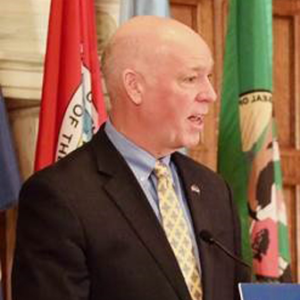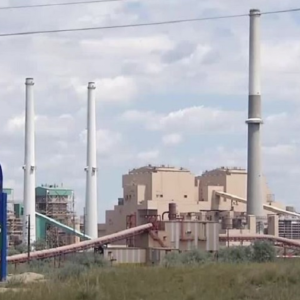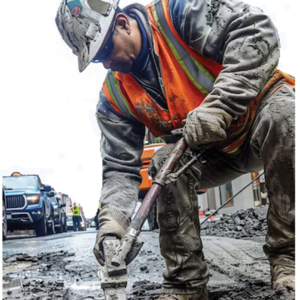Glacier Park International Airport was awarded another $2.5 million in federal funding recently for its ongoing terminal expansion project. Awarded through the FAA Airport Terminal Program, the dollars will expedite work on the expansion. A portion of the latest grant will go toward a third bag claim device which costs around $1 million.
U.S. Bureau of Reclamation announced recently that the first sections of the 90-inch replacement pipe for the St. Mary Siphon had arrived. This sets the stage for replacing the infrastructure that delivers water to the Milk River Project, a lifeline for north-central Montana. As an irrigation project the Milk River Project and the St. Mary Diversion and Conveyance works were one of the first projects the Bureau of Reclamation was authorized to build after it was created in 1902. The St. Mary Canal Siphon suffered a catastrophic failure June 17, 2024. It was constructed in two phases, with the downstream barrel completed between 1912 and 1915 and the upstream barrel after 1925.
The Stafford/McClelland Ferry will be removed from the Missouri River on October 31.
Whitefish’s Stack Financial Management climbed from #72 to #57 on the 2024 CNBC Financial Advisor 100 list. Stack Financial Management is a nationally recognized, independent Registered Investment Advisor based in Whitefish managing over $1.9 billion in assets for individuals, families and business owners across the U.S.
The University of Montana has hired Dr. Jeffrey Michael to serve as the next director of the Bureau of Business and Economic Research. Michael joins BBER from the University of the Pacific where he has served as director of Public Policy at the McGeorge School of Law. Michael has decades of experience in regional economic forecasting,
Independence Bank has announced the promotion of Lauren Kato to Teller Supervisor and Accountant Relations Specialist. Lauren is a native of Havre.
Independence Bank recently announced the promotion of Sydne Haider to Account Relations Supervisor. Sydne joined the bank October 13, 2021, as an Account Relations Specialist.
Montana Fish, Wildlife and Parks has finalized its plan for managing grizzly bears. Last month, FWP Director Dustin Temple formally adopted a 326-page outline for how the state will address conflicts between bears and people, approach an eventual trophy hunt and respond to the state’s growing grizzly population.
Sarah and Rob Ratkowski, owners of the Montana Milk Moovers home delivery service, are now offering regular access to fresh, local goods through the Neighborhood Market. The market opened recently off Montana 35. The shop offers dairy products, eggs, produce, meat and other pantry items . The market receives its goods through the Western Montana Growers Cooperative.
Stephanie Cole, a fourth-generation Montanan from Bozeman, is the new chief executive officer of Red Ants Pants, the company announced. Red Ants Pants, based in White Sulphur Springs, sells work wear for women.
The Montana Public Service Commission announced that as of Oct. 1, a typical NorthWestern Energy residential electric customer using 750 kilowatt-hours per month saw a decrease of $6.13 or 5.57% of their monthly electric bill. The decrease comes due to a recent submission to the PSC of NorthWestern’s Annual Power Costs and Credits Adjustment Mechanism (PCCAM).
Glacier National Park saw a record number of visitors in September, according to data from the National Park Service. More than 600,000 visitors passed through one of Glacier’s entrances during September, nearly 50,000 more than in 2023. So far in 2024, 3,001,595 people have visited the park, just the third time that number has eclipsed 3 million and a 9% increase over last year.
The Montana Public Service Commission denied an interim rate increase requested by Montana-Dakota Utilities earlier this year. MDU filed a rate case with the PSC in July requesting a natural gas rate increase of 16.4% for residential customers. As the PSC considers the rate case as a whole, the utility company requested an interim rate increase. The temporary increase would bring the cost to the average residential customer using 78 dekatherms of natural gas up $5.17 per month.
Yellowstone National Park hosted 838,458 visitors in September. So far in 2024, the park has hosted 4,349,689 recreation visits, up 5% from 2023. The year-to-date numbers are just 120,000 lower than in 2021, the park’s record-setting year.
Sagebrush Boutique, a new business has opened in Miles City. Owned by Shawna Christofferson, the boutique celebrated its opening on Saturday, Oct. 26.
Bozeman Yellowstone International Airport set a September record for passenger traffic. In all, 249,773 passengers came through the Belgrade airport in September up 6.5% over the previous mark of 234,589 set in 2023. The busiest month was July, with 322,732 passengers.
The Treasure Chest of Hobbies and Crafts in Missoula is closing after over 45 years in business.
The Montana Department of Transportation has applied for federal funding to reduce collisions along U.S. Highway 191, one of Montana most wildlife collision-prone highways. The Center for Large Landscape Conservation, a Bozeman-based nonprofit announced that MDT has submitted a grant application.
The Missoula Family YMCA has received a $500,000 matching grant from the Dennis and Phyllis Washington Foundation. The gift was given in honor of Mike Halligan, the foundation’s outgoing executive director, who is set to retire in January of 2025.
Bloom Montessori School in Helena has announced it will close its child care center in December. Bloom is licensed to serve 132 students aged 0-6 years old.
Gov. Gianforte presented his annual Forest Products Award to the Weyerhaeuser Raw Materials Team at their Flathead Valley facility during Montana Forest Products Week. While the forest products marketplace continues to evolve, companies like Weyerhaeuser Raw Materials are helping support our economy and responsibly manage our forests,” Gov. Gianforte said. The honorees of the award included Weyerhaeuser team members Shaney Neuharth, Zack Miller, Milo Funk, and Jacob Parent. Miller and Parent focus on sustainable forest management and raw material procurement to ensure non-sawlog materials are used productively. Funk manages by-product procurement, handling over 400,000 tons annually, and Neuharth leads initiatives to utilize slash material for heating systems, reducing reliance on natural gas and lowering emissions.
The North Dakota Public Service Commission voted to approve a Certificate of Site Compatibility for Cerilon GTL North Dakota. Cerilon has proposed a gas-to-liquids facility that will transform natural gas into synthetic products. These products include Group III+ base oils, ultra- low sulphur diesel and naphtha. The site, near Trenton ND, was selected for several reasons— its proximity to abundant natural gas supplies, access to road and rail transportation, and existing local infrastructure. It also has access to sufficient electrical power for startup and interconnection to the power grid.
Four landmark properties are for sale in Livingston. They are Riverside Hardware and The Stockman Bar on Main Street, the 49er Diner, Bar and Casino on Park Street, and the former Livingston Enterprise building on South Main Street.
The Cascade County Detention Center in Great Falls is facing many of the same changes as Yellowstone County faces with overcrowding and having to detain inmates who should be treated for mental illness. Typical population numbers are over 400 inmates, occasionally exceeding 500, while the official jail capacity is 372. Officials are instituting two programs that could help relieve the jail of low-level offenders and offering mental health care.
North Dakota and South Korea will work together on energy and carbon capture technologies. North Dakota and South Korean officials signed a memorandum of understanding during North Dakota’s trade mission to South Korea. Their goal is to be carbon neutral by 2030, in part through carbon capture, utilization and storage. One of North Dakota’s largest manufacturers, Fargo-based Bobcat Co., is part of the South Korea-based Doosan Group.
Missoula has been awarded over $130,000 of federal funding to “improve energy efficiency and meet the city’s climate goals.” Missoula city government wants to make its operations carbon neutral by 2025, and to require the broader community be carbon neutral by 2050. The funds will pay for staff to develop new voluntary construction codes for building projects that improve weatherization and electrification above state requirements.
The North Dakota Aeronautics Commission (NDAC) has released its monthly report detailing airline passenger traffic at the state’s eight commercial service airports. With 98,371 passengers boarding flights within North Dakota this past month, it marks the busiest September on record, surpassing the previous high of 92,703 passengers set in September of 2014. The September 2024 figures reflect a year-over-year increase of 7,101 passengers, representing an 8% rise over September 2023. Additionally, this marks the fifth consecutive month of record-breaking passenger numbers for the state.
Montana Fish, Wildlife, and Parks (FWP) Region 7 staff is increasing public access at the Isaac Homestead Wildlife Management Area (WMA) in Hysham. The WMA was purchased by FWP in 1969 and was recently expanded with a purchase of a 414-acre parcel, totaling to 1,532 acres of native wildlife habitat and cultivated farm ground. The Montana Outdoor Legacy Foundation (MOLF), acting as Trust Manager for the Montana Fish and Wildlife Conservation Trust has finalized the sale of a 414-acre tract to FWP from the Lackman Family. The acquisition is located between the two existing units of the Isaac Homestead WMA, connecting the east and west portions and providing the only land-based access to the Yellowstone River.
Montana Knife Manufacturing in Missoula is building a $18 million, two-story, 50,000-square-foot facility that the owner says will eventually house 150-200 employees. Co-founded in a garage just four years ago, by Josh Smith and Brandon Horoho, the new state-of-the-art facility will include corporate offices, a coffee shop, and a viewing area to observe the knife-making process. They manufacture knives for various purposes, including hunting, professional cooking, and tactical use for law enforcement and the military.
Enrollment at the University of Montana jumped nearly 6% this fall. When including Missoula College, total enrollment at UM increased nearly 5%, marking the largest year-over-year jump in 15 years. In total, the university has 484 more students enrolled this fall when compared to last year, bringing total enrollment to 10,811.




